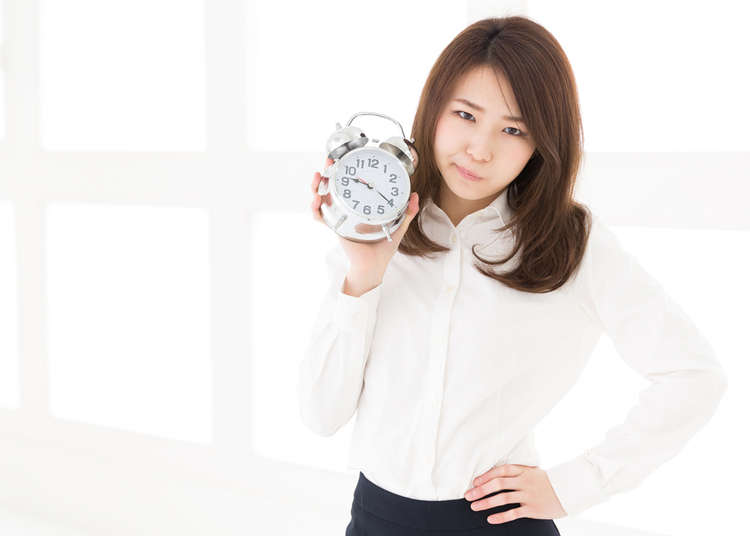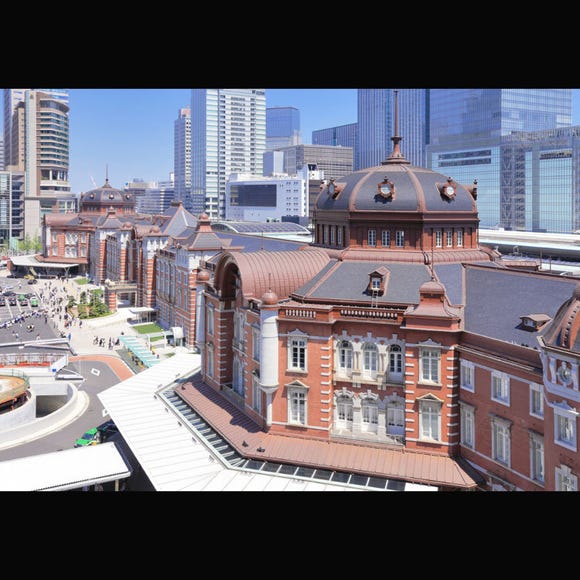
Japanese Expressions: Best Phrases for Complaining in 38+ Daily Situations
- Written by: Nao
Japan is well known for having a high degree of hospitality, and this is expressed in a variety of situations - from restaurants to shops to everyday life. But as with anything, people do make mistakes, and there is always a chance that you might experience poor service.
So what Japanese expressions can be used to complain and deal with a situation with finesse? Here are 38 highly useful Japanese phrases for to help you manage in common situations!
In this article:
・At a Restaurant
・At a Shop
・On a Train
・At Your Accommodation
・On the Street
Japanese Phrases For Complaining At A Restaurant/Cafe

1. No staff shows up for a long time
- "Sumimasen. Matte masu." = Excuse me. I'm waiting.
・Note: As a cultural point, it is okay to get staff's attention by calling or raising your hand in Japan. Some restaurants/cafes tend not to come to take your order until you call them as they want you to take time and feel no rush. In that case, just nicely say the Japanese word "sumimasen (excuse me)" to staff.
2. You are waiting for your meal for so long ...
- "Sumimasen, watashi no (e.g. ramen/coffee) mada desuka?" = Excuse me, hasn't my ramen been ready yet?
3. You received what you didn't order ...
- "Tanonde masen." = I didn't order (this).
4. You received the wrong meal ...
- "Kore, chigai masu." = This is not (what I ordered).
・"Kore" means "this", so you need to point at it to be clear.
5. You received more than you ordered ...
- “Ooi desu.” = (They are) too much.
- “Hitotsu shika tanonde masen.” = I only ordered one.
・one = hitotsu
・two = futatsu
・three = mittsu
- “Kore, tanonde masen.” = (I) didn’t order this.
6. Your plate/cutlery/glass/etc. is dirty ...
- "Kore, yogorete masu." = This is dirty.
・Note: If you are enjoying a meal at a very cheap restaurant, you might be required to accept the self-service system. In that case, find a place they provide new glasses/cutleries and help yourself. However, if you feel like to make a friendly report about the dirtiness, you can say “Kore, yogorete mashita.” (= This was dirty.) when you leave.
7. Your dish's got a bug/a hair/etc. in it ...!
- "Mushi haitte masu." = There is a bug in it.
- "Kami no ke haitte masu." = There is a hair in it.
- "Nani ka haitte masu." = There is something in it.
- "Kore haitte mashita." = This was in (my dish).
8. You want to have new/another one ...
- "Kaete kudasai." = Please, change it.
- "Atarashii no kudasai." = Please, give me a new one.
・This phrase can also be used when you want to have another cutlery after dropping it.
"Chigau no kudasai." = Please, give me another one.
(The literal meaning of the phrase is "please, give me a different one.")
9. Your dish is cold/tepid ...
- "Kore tsumetai desu." = This is cold.
- "Kore nurui desu." = This is tepid.
- “Atatame naoshite kudasai.” = Please, warm it up again.
10. Your dish tastes weird ... (e.g. stale, oddly sweet/bitter, etc.)
- "Hen na aji ga shimasu." = (It) tastes weird.
11. You don’t want to pay for your dish because it was faulty ...
- “Kore ni okane haraitaku arimasen. = (I) don’t want to pay for this.
- “Kore ni wa okane harae masen.” = (I) can’t pay for this.
- “Kore ni wa okane harai masen.” = (I) won’t pay for this. / (I’m) not gonna pay for this.
12. Staff ruined/broke your belongings and you want them to pay for damage ...
- "Bensho shite kudasai." = Please, give me compensation.
- "Cleaning dai kudasai." = Please, give me a dry-cleaning charge; = Please, pay for laundry.
- "Eigo shabereru hito imasuka?" = Is there anyone who speaks English?
13. The bill seems wrong ...
- "Machigatte masu." = (This is) wrong.
- "Machigatte masen ka?" = (Isn’t it) wrong?
- "Machigatteru to omoi masu." = I think (this is) wrong.
14. The change given is wrong ...
- "Tari masen." = (You gave me) not enough.
- "Oo sugi masu." = (You gave me) too much.
- "Machigatte masen ka?" = (Isn’t it) wrong?
・Note: There is no tipping culture in Japan, and all businesses strictly care about giving the right change to customers. Hence, you can’t leave any amount of tip nor small change even though you are thoroughly impressed by their service.
Japanese Phrases For Complaining At A Shop

15. You want to be left alone for a while to browse around ...
・As a culture in a clothing/goods shop in Japan, sellers very frequently speak to you to suggest ideas for outfits and coordination, to give further information about the clothes, or to give a sales pitch.
- "Miteru dake desu." = (I'm) just browsing.
- "Nani ka areba koe kakemasu." = (I'll) ask you when I have something (I want to know).
16. You want to say 'No' to a seller, who suggests you too persistently to buy something
- "Daijobu desu." = (I'm) good. = I don't want it.
・This is a polite way to reject the offer the Japanese often use.
- "Kekko desu." = (I'm) fine. = I don't want it.
・This is a slightly more formal phrase than the one above.
- "Sukoshi kangaemasu." = (I'll) think (about it) a bit. = I don't think I buy it.
・This is another way to say 'no' politely, which the Japanese also commonly use. Of course, you can use this phrase when you actually want to have some more time to think about it.
- "Atode mata kimasu." = (I'll) come back later. = I don't think I buy it. / I might buy it, but need a bit more time to think. / I just don't want to listen to your sales pitch any more, so I leave the shop for now. / etc.
・This is yet another polite 'no' phrase. Most Japanese use it when they want to leave the shop but can't stop a seller talking by saying 'no, I won't buy it'. It doesn't matter whether you actually come back or not. This phrase can be used when you want to think about the purchase with no pressure from the staff, you feel like to browse other shops to compare, or you just purely want to get out of the shop.
- "Iranai desu." = (I) don't want it. / (I) don't need it.
17. You realized what you purchased was broken ...
- "Koware te masu." = (It's) broken.
- “Yabure te masu.” = (It’s) torn.
・Note: In Japan, the return/refund policy depends on each shop. In many cases, there are a week or a month that you can request a refund/return within, on condition that the product is faulty. However, a few shops state no return/refund except the immediate claim right after the purchase, which means you need to examine the products you bought at once. Although this is a rare case, you might want to check their return/refund policy before you buy, or, to be even safer, would be better examine the product carefully before you check out.
To add one thing, many shops in Japan generally do not accept a return/refund without any faulty aspect, which means you can't have any second thoughts after purchases. I also strongly recommend you to keep the receipt as you definitely need it to exchange the goods you bought to another in a different size.
18. You got the wrong product ...
- "Kore ja nai desu."= This is not (what I bought).
Japanese Phrases: On a train

19. The train's delayed ...
- "Dore kurai okurete masuka?" = How long is it delayed for?
- "Itsu kimasu ka?" = When (is the train) arriving?
- "Itsu demasu ka?" = When (is this train) departing?
- "Hoka no ikikata wo oshiete kudasai." = Please, tell me another way to get (there).
・You need to tell them/point on the map where you want to go.
- "Hurikae-yuso-hyo kudasai." = Please, give me a 'hurikae-yuso-hyo.'
・Note: If there is a significant delay and you need to take another train/bus/any other provided public transports, you may need a special ticket called 'hurikae-yuso-hyo' to show other ticket officers/drivers that you already paid for the train which is delayed. Generally, you'll be given it at the gate counter or nearby by staff.
20. Someone cut in line when you are waiting for a train ...
- "Nukasa naide kudasai." = Please, do not cut in line.
- "Narande masu." = I'm in line.
・Note: In Japan, passengers always neatly be in line to get on a train/bus/taxi/etc. You'll find colorful marks on the platform, and a mark or a line at the bus/taxi pool, which is quite hard to miss. If you are not sure about where to make a line, do not hesitate to ask Japanese "Doko ni narabeba ii desuka?" (Where should I line up?), and they'll kindly tell you!
21. Someone's pushing you even though it's not packed at all ...
- "Osanaide kudasai." = Please, don't push (me).
- "Itai desu." = It hurts.
22. Someone's touching you (on purpose) ...!
- "Yamete kudasai."/"Yamete." = Please, stop it.
- "Yamero." (An order) = Stop it.
- "Sawara nai de." = Please, don't touch (me).
- "Sawaruna." (An order) = Don't touch (me).
23. Someone's stepping on your foot in a busy train ...!
- "Sumimasen, ashi hundemasu." = Excuse me, (you are) stepping on my foot.
24. You can't get off because someone is/people are blocking ...
- "Sumimasen, orimasu." = Excuse me, (I'm) getting off.
- "Sumimasen, tori masu." = Excuse me, (I'm) coming through.
- "Toshite kudasai." = Please, let me go through.
25. There is someone in need but no seat available ...
- (To a person sitting) "Sumimasen, yuzutte agete kuremasuka?" = Excuse me, could you please give your seat (to the lady/gentlemen/etc).
- (To a person sitting) "Sumimasen, yuzutte agete." = Excuse me, please give your seat (to the lady/gentlemen/etc).
Japanese Expressions: At your accommodation

26. Someone’s too noisy ...
- "Shizuka ni shite kudasai." = Be quiet, please.
- "Mou sukoshi shizukani shite kuremasuka?" = Can you please keep it down a bit?
- "Tonari no heya ga urusai desu." = People in the next room is noisy.
27. Your room doesn't seem to be cleaned up...
- "Heya ga kitanai desu." = (My) room is dirty.
- "Souji sarete masen." = (My room) has not been cleaned up.
28. Room equipment is broken...
- "Koware te masu." = (It's/This is) broken.
- "Okashii desu." = (It's/This is) weird. = It doesn't work properly.
- "Ugoki masen." = (It/This) doesn't move. = (It/doesn't) doesn't work/turn on.
- "Utsuri masen." (Only for TV) = (The TV) doesn't turn on.
29. Room amenities are missing...
- "Towel/Ha brush/Glass ga ari masen." = There is no towel/toothbrush/glass.
- "Towel/Blanket/Slippa wo kudasai." = Please, (give me) towel/blanket/slippers.
30. Your room's smelly...
- "Heya ga kusai desu." = (My) room stinks.
- "Tabako kusai desu." = (My room/The bed/The sofa) smells tobacco.
- "Hoka no heya ni utsure masu ka?" = Is it possible to change the room?
- "Heya wo kaete kudasai." = Please, change the room.
31. Someone keeps you up ...
- "Nekasete kudasai." = Please, let me sleep.
- "Netai desu." = I want to sleep.
- "Abare naide kudasai." = Please, don't/stop acting up.
(For example, when a kid upstairs running or jumping late at night.)
- "Shizuka ni shite kudasai." = Please, be quiet.
32. Someone awakens you ...
- "Okosa naide kudasai." = Please, don't wake me up.
- "Jama shinai de kudasai." = Please, do not disturb (me).
- "Mada nete masu." = I'm still sleeping. = I'm still in bed.
33. The luggage given was not yours ...
- "Watashi no ja nai desu." = (It's) not mine.
- "Chigai masu." = (It's) not (mine).
Japanese Phrases: On the street

34. Someone recommends you what you really don't need/want ...
・If you go to Shibuya, Ikebukuro, Shinjuku or any other big cities, you are very likely to see people on the street called 'Kyacchi' (= a kind of tout), who try to take you to their shop, such as Japanese izakaya. This behaviour is usually against the rule of most cities, so you don't have to be overly nice to them. I recommend you to simply say 'No' and keep ignoring if they follow you.
- "Kekko desu." = (I'm) fine./ (I) don't need it.
・This is quite a formal phrase.
- "Iki masen." = (I) don't go (there). / (I) don't come (with you).
- "Iranai desu." = (I) don't need/want it.
- "Iri masen." = (I) don't need/want it.
・Slightly more formal than the one above.
35. Someone persistently hits on you ...
- "Shitsukoi." = You are persistent. = Stop it now.
- "Hottoite." = Leave (me) alone.
- "Kyomi nai desu." = (I'm) not interested.
36. Someone/A group of people is (are) blocking the street ...
- "Tori masu." = (I'm) coming through.
- "Toshite kudasai." = Please, let (me) come through.
37. Someone is doing something dangerous ...
- "Abunai desu." = (It is) dangerous.
・A polite phrase.
- "Abunai!" = (It's) dangerous!
- "Yamete!" = Stop it!
- "Yamete kudasai." = Can you please stop it?
・A more polite phrase.
38. When you get into serious trouble ...
- "Keisatsu yobimasu." = (I'll) call the police.
- "Keisatsu yonde kudasai." = Please, call the police.
・Note: In case of emergency, call 110 for police and 119 for ambulance/fire.
- "Eigo shabereru hito imasuka?" = Is there anybody who speaks English?
- "Eigo wakaru hito imasuka?" = Is there anybody who understands English?
In many businesses in Japan, they try to stay positive when they made a mistake and think it can be a great chance to let a customer through even nicer experience. Therefore, don't get disappointed too much! They will recover it for you, and then you'll eventually see high Japanese hospitality.
A Japanese writer who is from a city by the sea. Started writing from the age of ten. Since then, pen and notebook have always been the best friend. Loves travelling, tea, and books.
*Prices and options mentioned are subject to change.
*Unless stated otherwise, all prices include tax.
Popular Tours & Activitiess
Recommended places for you
-

To the Holy Land of Kawaii! Odakyu Tama Center Station Is Becoming a Dreamy Sanrio Wonderland
by: Guest Contributor
-

Farewell, Heavy Suitcases! Keisei Ueno’s New Service Makes Your Last Day in Tokyo Totally Hands-Free
by: Guest Contributor
-

PokéPark KANTO Is Finally Open! Tokyo's New Pokémon World Starts Before You Even Arrive (2026)
by: Guest Contributor
-
Ad

What Makes Japanese Yakiniku So Darn Good? Guide to Cuts, Heat, and Wagyu Know-How
-

Where to Buy a Japanese Kitchen Knife? Why Travelers Choose MUSASHI JAPAN's 14 Stores in Tokyo, Kyoto, and Nara
by: Guest Contributor
-
Ad

Japan’s Land of Yokai Monsters and Spooky Stories! A Deep Journey to Mysterious San’in (Tottori & Shimane) for Seasoned Travelers
-

Meiji Shrine (Meiji Jingu): Exploring the Sacred Sanctuary of Peace in Bustling Tokyo
-

Tokyo Roppongi|Roppongi Station Area Map & Sightseeing Information
-

[MOVIE] The Anime Musical Experience: Real-Life Sailor Moon at AiiA 2.5 Theater Tokyo
by: Pamela Drobig
-

Tokyo Tsukiji|Tsukiji Area Map & Sightseeing Information
-

Spending Wonderful Time Alone in Shibuya - Free Cosmetics and a Hundred-Yen Bus!
-

Roppongi: Then and Now
- #best ramen tokyo
- #what to buy in ameyoko
- #what to bring to japan
- #new years in tokyo
- #best izakaya shinjuku
- #things to do tokyo
- #japanese nail trends
- #what to do in odaiba
- #onsen tattoo friendly tokyo
- #daiso
- #best sushi ginza
- #japanese convenience store snacks
- #best yakiniku shibuya
- #japanese fashion culture
- #best japanese soft drinks



















